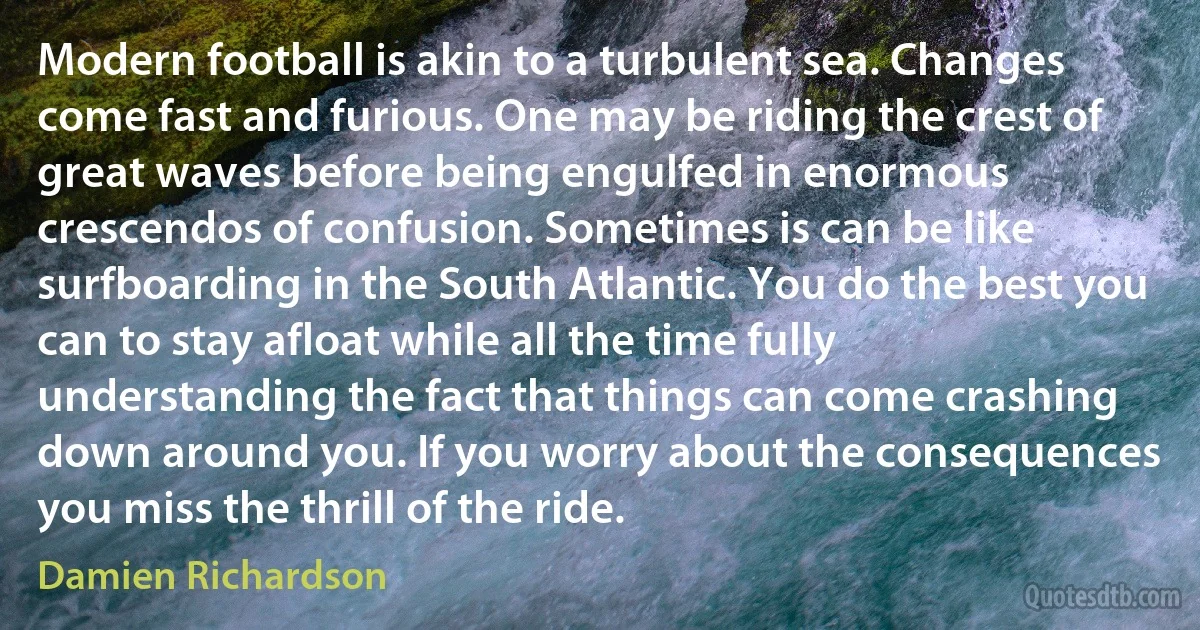Sea Quotes - page 79
. . . however baby man may brag of his science and skill, and however much, in a flattering future, that science and skill may augment yet for ever and for ever, to the crack of doom, the sea will insult and murder him, and pulverize the stateliest, stiffest frigate he can make nevertheless, by the continual repetition of these very impressions, man has lost that sense of the full awfulness of the sea which aboriginally belongs to it.

Herman Melville
The expected effects of a sea-level rise typify the many consequences of a global warming. On the one hand, they are so big we literally can't understand them. If there is a significant polar melting, the Earth's center of gravity will shift, tipping the globe in such a way that the sea level might actually drop at Cape Horn and along the coast of Iceland-I read this in a recent EPA report and found that I didn't really understand what it meant to tip the Earth, through I was awed by the idea. On the other hand, the changes ultimately acquire a quite personal dimension: Should I put in a wall in front of my house? Does this taste salty to you? And, most telling of all, the human response to the problems, the utterly natural human attempt to preserve the old natural way of life in this postnatural world, creates entirely new consequences. The ocean rises; I build a wall; the marsh dies, and, with it, the fish.

Bill McKibben
A man may make his way across the Atlantic in a skiff, for all I know; but if you are intending to cross the sea, take my advice, and secure passage in a first-class steamer, and you will be more likely to get there. So it is with these heathen millions. I do not know but some of them may drift, and we shall find them in the city of God. But I do know that by giving them the gospel, by building up and supporting among them a Christian church, we shall greatly multiply their chances for heaven.

Charles Henry Fowler
I have no religion, and at times I wish all religions at the bottom of the sea. He is a weak ruler who needs religion to uphold his government; it is as if he would catch his people in a trap. My people are going to learn the principles of democracy, the dictates of truth and the teachings of science. Superstition must go. Let them worship as they will; every man can follow his own conscience, provided it does not interfere with sane reason or bid him against the liberty of his fellow-men.

Mustafa Kemal Atatürk
You play a 'lowdown dirty shame slow and lonesome, my mama dead, my papa across the sea I ain't dead but I'm just supposed to be' blues. You can take that same blues, make it uptempo, a shuffle blues, that's what rock n' roll did with it. So blues ain't going nowhere. Ain't goin' nowhere.

David Edwards
The terminally cute sea otter is a marine weasel into rough sex. The male otter's arms (legs, whatever) are effective for grooming their fine pelts or cracking shells on the rocks they place on their bellies, but they are too short for getting a good grip on a mate. So the male gets firm purchase by biting down on the female's nose before going for a little splendor in the kelp. Afterward you can often spot the females hauled up on rocks along the shore, their fur matted and their noses bloody. It's not hard to imagine that a female with a heavily scarred nose might get a reputation as an easy otter.

David Helvarg
Turtles, he adds, and such large ammonites as are found in Portland, seem to have been the productions of the seas of hotter countries, and it is necessary to suppose that England once lay under the sea within the torrid zone! To explain this and similar phenomena, he indulges in a variety of speculations concerning changes in the position of the axis of the earth's rotation, a shifting of the earth's center of gravity, 'analogous to the revolutions of the magnetic pole,' &c. None of these conjectures, however, are proposed dogmatically, but rather in the hope of promoting fresh inquiries and experiments.

Charles Lyell
So, it was argued, the Mediterranean had once opened a passage for itself by the Columns of Hercules into the Atlantic, and perhaps the abundance of sea-shells in Africa, near the Temple of Jupiter Ammon, might also be the deposit of some former inland sea, which had at length forced a passage and escaped.

Charles Lyell
Strabo,... enters largely, in the Second Book of his Geography, into the opinions of Eratosthenes and other Greeks on one of the most difficult problems in geology, viz., by what causes marine shells came to be plentifully buried in the earth at such great elevations and distances from the sea.

Charles Lyell
Your only safety lies in placing yourself in circumstances which will make exertion necessary, and which will secure Divine assistance. Never mind your infirmities. You have nothing to do with them. Your business is to trust, and to go forward. If you wait till the sea becomes land, you will never walk on it. You must leave the ship, and, like Peter, set your feet upon the waves, and you will find them marble.

Edward Payson
Standing on my watch-tower I am commanded, if I see aught of evil coming, to give warning. I solemnly declare that I do discern evil approaching; I see a storm collecting in the heavens; I discover the commotion of the troubled elements; I hear the roar of a distant wind - heaven and earth seem mingled in the conflict - and I cry to those for whom I watch, "A storm! A storm! Get you into the ark or you are swept away. "Oh! what is it I see? I see a world convulsed and falling to ruins - the sea burning like oil - nations rising from under ground - the sun falling - the damned in chains before the bar, and some of my poor hearers among them! I see them cast from the battlements of the judgment scene. My God! the eternal pit has closed upon them forever!

Edward Dorr Griffin
The practice of creating chartered joint-stock companies of a modern type seems to have begun at the commencement of the seventeenth century; and the formation of the East India Company is one of the earliest, if not the very earliest, examples. At first, it appears, the 'joint stock' of the company was separately made up for each ship; perhaps for each voyage. But, in the year 1612 the Company made the momentous resolve to have one joint stock for the whole of its affairs, and thus inaugurated a new epoch. The East India Company, or Companies, (for there were two of them), were followed by the Hudson's Bay Company (1670), the existence of which was recognized by statute in 1707, and by the Bank of England and the notorious South Sea Company.

Edward Jenks
Such is the remorseless progression of human society, shedding lives and souls as it goes on its way. It is an ocean into which men sink who have been cast out by the law and consigned, with help most cruelly withheld, to moral death. The sea is the pitiless social darkness into which the penal system casts those it has condemned, an unfathomable waste of misery. The human soul, lost in those depths, may become a corpse. Who shall revive it.

Victor Hugo



